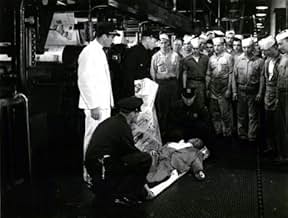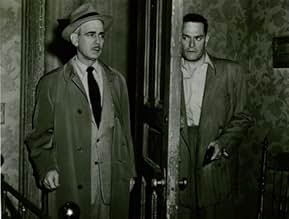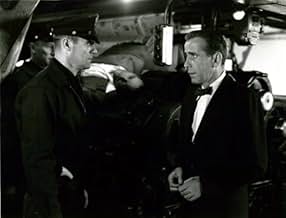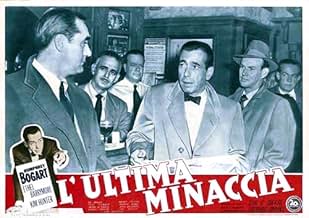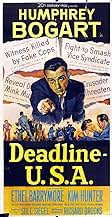IMDb-BEWERTUNG
7,2/10
4653
IHRE BEWERTUNG
Obwohl seine Zeitung kurz vor dem Verkauf steht, versucht der kämpferische Redakteur Ed Hutcheson, einen Enthüllungsbericht über den Gangster Rienzi fertigzustellen.Obwohl seine Zeitung kurz vor dem Verkauf steht, versucht der kämpferische Redakteur Ed Hutcheson, einen Enthüllungsbericht über den Gangster Rienzi fertigzustellen.Obwohl seine Zeitung kurz vor dem Verkauf steht, versucht der kämpferische Redakteur Ed Hutcheson, einen Enthüllungsbericht über den Gangster Rienzi fertigzustellen.
- Auszeichnungen
- 2 wins total
Joe De Santis
- Herman Schmidt
- (as Joseph De Santis)
Parley Baer
- Headwaiter
- (Nicht genannt)
Bill Baldwin
- Man Asking for Ed Hutcheson
- (Nicht genannt)
Willis Bouchey
- Henry
- (Nicht genannt)
Lovyss Bradley
- Woman
- (Nicht genannt)
John Brooks
- Reporter
- (Nicht genannt)
Ralph Brooks
- Newspaperman
- (Nicht genannt)
Empfohlene Bewertungen
Being the editor of a newspaper is intense, when the world outside your window don't make sense, where gangsters rule the roost, the owners easily seduced, an ex-wife who will not give you recompense. So we follow you around and watch you play, it's fair to say, that these are not ordinary days, always going toe to toe, they could be friends, they could be foes, but you ensure everyone, hears what you say. The performances are fine and competent, the emotion and the passion sufficient, not really sure the story's deep, there's not a lot of underneath, but it's 90 minutes that can be well spent.
A very good movie about The Day, a newspaper publishing its last editions, and its aggressive attack on a known mobster.
Humphrey Bogart does an excellent job as the editor, and Ethel Barrymore gives a wonderful, regal performance as the widow of the publisher, whose daughters are now demanding that the paper be sold to a competitor.
The film brings up, a mere 53 years ago, issues that are relevant today - the tabloids versus real, factual news, and the meaning of a free press. These debates continue today, but unfortunately, it seems that the tabloid type of journalism is winning.
As for a free press - our press might be freer than many, but it isn't entirely free. As anyone who lost money in the great savings and loan scandal can tell you, important stories disappear from the front pages all the time.
Bogart's strong performance is the engine that keeps this film going, and there's a nice performance by Kim Hunter as his ex-wife.
Deadline USA reminds us of the good old days, when you could believe what you read in the New York Times.
Humphrey Bogart does an excellent job as the editor, and Ethel Barrymore gives a wonderful, regal performance as the widow of the publisher, whose daughters are now demanding that the paper be sold to a competitor.
The film brings up, a mere 53 years ago, issues that are relevant today - the tabloids versus real, factual news, and the meaning of a free press. These debates continue today, but unfortunately, it seems that the tabloid type of journalism is winning.
As for a free press - our press might be freer than many, but it isn't entirely free. As anyone who lost money in the great savings and loan scandal can tell you, important stories disappear from the front pages all the time.
Bogart's strong performance is the engine that keeps this film going, and there's a nice performance by Kim Hunter as his ex-wife.
Deadline USA reminds us of the good old days, when you could believe what you read in the New York Times.
The 40's and 50's had quite a few movies in which newspapers and newspapermen were the central focus. There was "Scandal Sheet," "Ace in the Hole," "It Happened Tomorrow," "Foreign Correspondent," "His Girl Friday," this movie, and others. I suppose it makes sense considering print media was the largest and most influential form of media with television a decade or so away from becoming the ubiquitous medium it is now.
Ed Hutcheson (Humphrey Bogart) was the editor of The Day, a thriving New York newspaper. The owner and founder had just died and The Day was being sold by the wife and the two daughters. Ed was giving it his all trying to do what he could to prevent the sale as well as continue to print relevant news. He dedicated all of his staff and resources to looking into a local mobster named Tomas Rienzi (Martin Gabel) when one of his reporters was hospitalized for digging up too much information on the same gangster. He thought maybe, just maybe, this story would both: expose a criminal and save the paper.
This was an ideologue movie. There were two stories running parallel to each other. One was the story of the gangster and his outsized influence, the other was the newspaper being sold to a competitor who was going to shutter it. The gangster story was a thrilling one, but the paper being sold was a principled one.
If The Day was sold to a competitor and then closed down, that would be one less voice for the people. It would be one less viewpoint, one less source of news, and one less competitor for the other papers. Such a thing couldn't be good for the reader and the average citizen. Market competition has always benefited the consumer (even though it's not benefiting us much nowadays with gas prices) while monopolies have always harmed the consumer.
This was a pivotal issue with The Day being sold, but it also directly confronted a person's or business's capitalistic right to sell their property. Should the courts prevent this sale based upon it taking away a source of news from your average citizen, what other sales would the courts be allowed to, or have to prevent? It was a novel argument that played out on screen and gave the viewer food for thought.
Free on YouTube.
Ed Hutcheson (Humphrey Bogart) was the editor of The Day, a thriving New York newspaper. The owner and founder had just died and The Day was being sold by the wife and the two daughters. Ed was giving it his all trying to do what he could to prevent the sale as well as continue to print relevant news. He dedicated all of his staff and resources to looking into a local mobster named Tomas Rienzi (Martin Gabel) when one of his reporters was hospitalized for digging up too much information on the same gangster. He thought maybe, just maybe, this story would both: expose a criminal and save the paper.
This was an ideologue movie. There were two stories running parallel to each other. One was the story of the gangster and his outsized influence, the other was the newspaper being sold to a competitor who was going to shutter it. The gangster story was a thrilling one, but the paper being sold was a principled one.
If The Day was sold to a competitor and then closed down, that would be one less voice for the people. It would be one less viewpoint, one less source of news, and one less competitor for the other papers. Such a thing couldn't be good for the reader and the average citizen. Market competition has always benefited the consumer (even though it's not benefiting us much nowadays with gas prices) while monopolies have always harmed the consumer.
This was a pivotal issue with The Day being sold, but it also directly confronted a person's or business's capitalistic right to sell their property. Should the courts prevent this sale based upon it taking away a source of news from your average citizen, what other sales would the courts be allowed to, or have to prevent? It was a novel argument that played out on screen and gave the viewer food for thought.
Free on YouTube.
"It's not our job to prove he's guilty. We're not detectives and we're not in the crusading business." That line from Humphrey Bogart early in the film lets you know you're watching a movie about a bygone era in journalism. Or maybe that's just an idealized fantasy and reporters were never like that, because later in the film Bogart contradicts himself by instructing his reporters to "go below the belt" and "we're gonna convict him of every crime on the books." Feelings on journalistic philosophy aside, this is an exceptional crime drama about the goings-on at a newspaper that's going out of business. Before the doors are closed, editor Bogart and his reporters try to uncover the truth about a racketeer's criminal activities.
Bogart turns in one of his finest acting turns, with terrific support from Ethel Barrymore, Martin Gabel, Ed Begley, Kim Hunter, Warren Stevens, Jim Backus, and many more. The story moves along at a smooth pace and keeps your interest throughout. There's quite a bit of monologuing but the script is packed with punch and grit. It's one of the better films in writer & director Richard Brook's career. It's worth a look on its merits as a dramatic film, as well as the added historic value it has for those looking to examine the differences and similarities between how journalism was viewed yesterday versus today.
Bogart turns in one of his finest acting turns, with terrific support from Ethel Barrymore, Martin Gabel, Ed Begley, Kim Hunter, Warren Stevens, Jim Backus, and many more. The story moves along at a smooth pace and keeps your interest throughout. There's quite a bit of monologuing but the script is packed with punch and grit. It's one of the better films in writer & director Richard Brook's career. It's worth a look on its merits as a dramatic film, as well as the added historic value it has for those looking to examine the differences and similarities between how journalism was viewed yesterday versus today.
The film opens with a businessman being questioned in a courtoom, similar to the House Un-American Committee This newspaper may be sold, right in the middle of the biggest news story of the year. Stars Bogart as the editor, and Ethel Barrymore as Mrs. Garrison, the owner. and Jim Backus (Mr. Howell, from Gilligan's Island) is in here. Bogart tries to convince Mrs. Garrison to keep the paper going, but its an uphill battle. Not a lot of votes on imdb for this one, so TCM must not show it very often. Touching scene, where the reporters all hold a memorial for the paper in the bar.... even more prescient today, when there are very few papers left, and those few are an endangered species. Some similarites to Citizen Kane, where the respectable paper can't compete with the yellow, sensational papers for circulation. Written and directed by Richard Brooks, who was married to Jean Simmons. Pretty good stuff. I had never seen this one before. It really strikes a nerve today, with the interwebs really killing off newspapers.
Wusstest du schon
- WissenswertesOriginally titled 'The Newspaper Story', location shooting took place both in the newsroom and the printing plant of The New York Daily News, with real pressmen playing themselves. This was augmented by an 'almost letter-perfect' reproduction of a newsroom on a Hollywood soundstage.
- PatzerAs Rienzi's car drives off after picking up Hutcheson, a large studio light is reflected against the side window of the car.
- Zitate
[last lines]
Ed Hutcheson: That's the press, baby. The press! And there's nothing you can do about it. Nothing!
- VerbindungenFeatured in Das einzige Spiel in der Stadt (1970)
- SoundtracksJohn Brown's Body
(uncredited)
Traditional tune, lyrics attributed to various writers
Sung, with modified lyrics, by the staff in the bar and heard as a theme at other times.
Top-Auswahl
Melde dich zum Bewerten an und greife auf die Watchlist für personalisierte Empfehlungen zu.
- How long is Deadline - U.S.A.?Powered by Alexa
Details
Box Office
- Weltweiter Bruttoertrag
- 5.228 $
- Laufzeit
- 1 Std. 27 Min.(87 min)
- Farbe
- Seitenverhältnis
- 1.37 : 1
Zu dieser Seite beitragen
Bearbeitung vorschlagen oder fehlenden Inhalt hinzufügen


